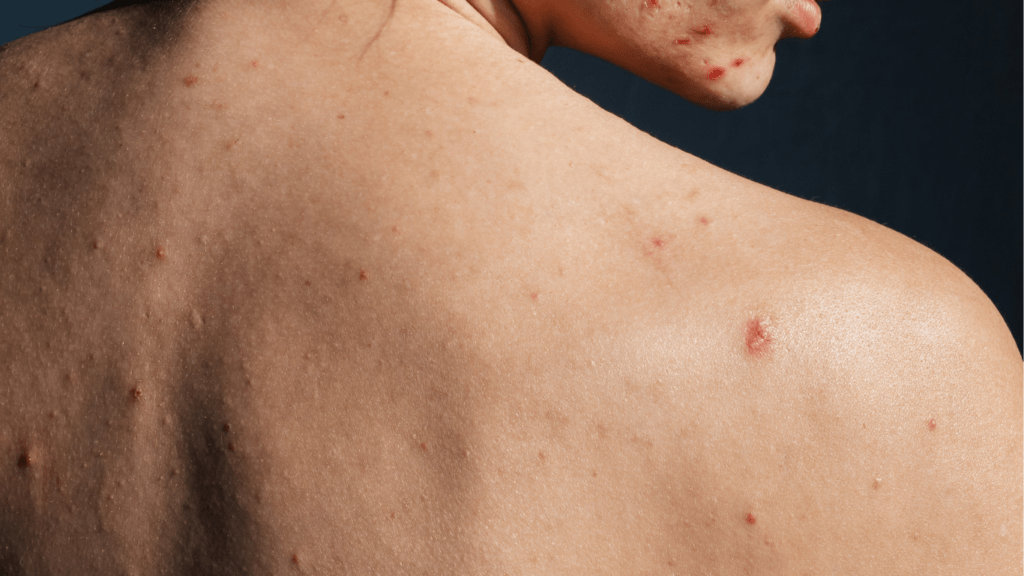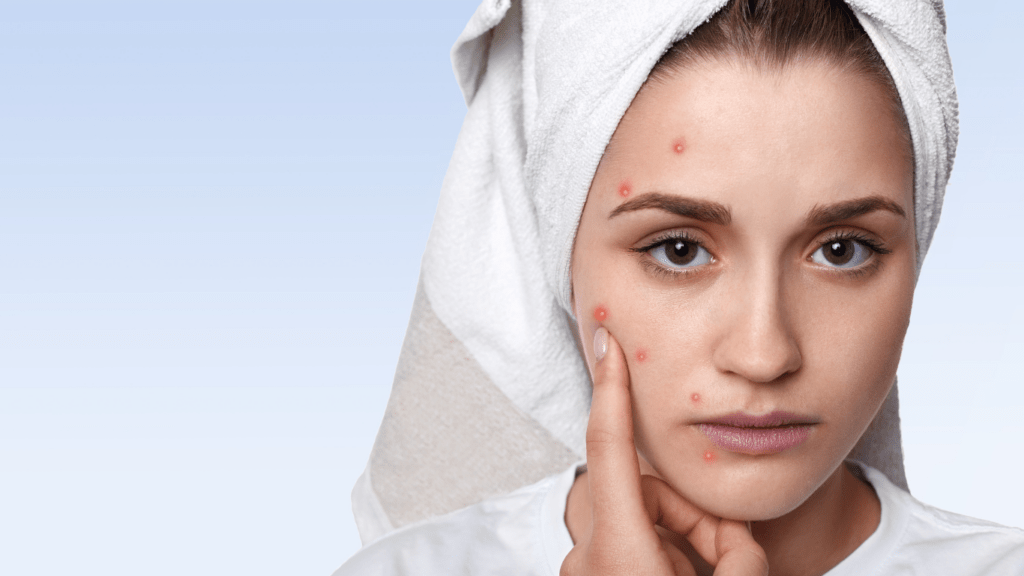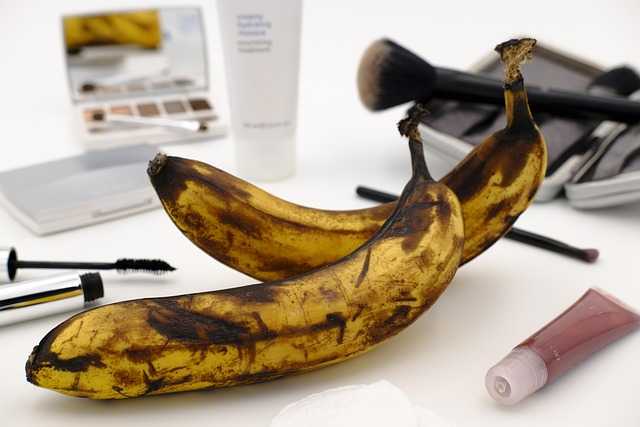The Impact of Sugar on Your Skin: An Overview
Sugar affects the skin in multiple ways. When consumed, sugar increases insulin levels, causing a burst of inflammation throughout the body.
This inflammation breaks down collagen and elastin, key proteins for keeping skin smooth and firm. The breakdown results such as:
- premature aging
- fine lines
- wrinkles
According to a 2010 study published in the Journal of Clinical Endocrinology and Metabolism, higher blood sugar levels accelerate aging by promoting these proteins’ degradation.
Moreover, sugar can exacerbate skin conditions like acne. Elevated insulin spikes increase oil production and trigger inflammation, creating an ideal environment for acne-causing bacteria.
The American Academy of Dermatology confirms that high-glycemic diets correlate with heightened acne severity. Recurring breakouts often follow sugar binges, underscoring the need for dietary adjustments.
Advanced Glycation End Products (AGEs) form when sugar binds to proteins. These harmful compounds damage skin’s structural integrity, leading to sagginess and dullness.
Studies have shown that AGEs contribute significantly to the aging process by impacting skin’s firmness and elasticity.
Sugar also dehydrates the skin. High sugar levels cause cells to release water, leading to dryness and dullness. Proper hydration is essential for a glowing complexion, and excess sugar disrupts this balance.
Lowering sugar intake can visibly improve skin health. I observed fewer breakouts and enhanced skin elasticity when I limited sugary foods. Reducing sugar not only benefits overall health but also promotes a clearer, more youthful appearance.
The Science Behind Sugar and Skin Health
The body responds to sugar in ways that can harm skin health. Understanding these biochemical interactions provides insight into how reducing sugar intake can lead to clearer, more youthful skin.
How Sugar Contributes to Aging
Sugar ages skin by promoting the formation of Advanced Glycation End Products (AGEs). AGEs occur when sugar binds to proteins like collagen and elastin.
These vital proteins maintain skin’s firmness and elasticity. AGEs contribute to the breakdown of these proteins, causing sagging, fine lines, and wrinkles. By minimizing sugar intake, the production of AGEs decreases, preserving skin’s structural integrity.
Sugar’s Role in Inflammation and Acne
Sugar fuels inflammation, a key factor in acne development. High sugar intake spikes insulin levels, which, in turn, boosts oil (sebum) production.
Excess sebum can clog pores, leading to bacterial growth and acne. Eliminating or reducing sugar diminishes these insulin spikes, reducing both oil production and inflammation. Consequently, skin becomes less prone to acne and irritation.
Dietary Sugar and Its Effects on Various Skin Conditions

Sugar consumption impacts several skin conditions, leading to issues like increased acne and exacerbated eczema symptoms. Understanding these effects can aid in managing skin health.
Effects on Acne Proneness
High sugar intake can worsen acne by triggering insulin spikes and increased sebum production. Foods with a high glycemic index (GI) cause rapid blood sugar elevation, leading to higher insulin levels that stimulate androgen hormones.
This results in more oil production, clogged pores, and acne breakouts. Studies show that people who consume high-GI foods frequently are likelier to develop severe acne.
Reducing sugar intake helps decrease inflammatory cytokines linked to acne severity.
Influence on Eczema and Other Skin Diseases
Dietary sugar may aggravate eczema and other inflammatory skin conditions due to its pro-inflammatory properties. Excessive sugar consumption increases cytokines, contributing to eczema flare-ups and skin irritation.
A study found that individuals with high-sugar diets experienced more frequent and intense eczema symptoms compared to those with lower sugar consumption.
Replacing high-sugar foods with anti-inflammatory options may help manage eczema and other skin conditions, leading to healthier, less reactive skin.
Alternative Sweeteners and Skin Health
Reducing sugar improves skin health, but finding effective alternatives can be challenging. Let’s explore natural and artificial sweeteners and best practices for reducing sugar intake.
Comparing Natural and Artificial Sweeteners
Natural sweeteners come from plants and include:
- honey
- maple syrup
- stevia
Honey’s antioxidants and anti-inflammatory properties benefit the skin.
Maple syrup contains antioxidants that protect the skin from damage. Stevia, a zero-calorie sweetener, doesn’t spike blood sugar, avoiding inflammation.
Artificial sweeteners, like aspartame and sucralose, provide sweetness without calories.
However, their impact on skin health isn’t extensively studied. Some evidence suggests potential gut microbiome disruption, which could indirectly affect the skin.
Best Practices for Reducing Sugar Intake
Start by reading nutrition labels to avoid hidden sugars in processed foods. Replace sugary drinks with water, herbal teas, or beverages sweetened with stevia.
When baking, use natural sweeteners like honey or maple syrup. Gradually reduce sugar in recipes to adjust taste preferences.
Identify sugar cravings and find healthier snacks, such as fruit or nuts. Planning meals to include balanced macronutrients helps maintain steady blood sugar levels, which reduces skin inflammation.
Personal Stories and Expert Opinions
Skin health ties closely to diet, and many have shared their experiences regarding sugar’s impact on their complexion.
Testimonials on Sugar Reduction and Skin Improvement
Several individuals found that cutting sugar from their diet greatly improved their skin.
For example, Jane, 28, noticed a significant reduction in acne after eliminating sugary snacks and drinks over six months. She reported fewer breakouts, smoother skin, and less redness.
Another testimonial comes from Mark, 35, who struggled with eczema for years.
By reducing his sugar intake, he observed fewer flare-ups and less itching within three months. His skin felt more manageable, leading to an improved quality of life.
Julie, 22, decided to cut out sugary foods and saw her skin’s texture improve dramatically. Blemishes reduced and her overall complexion became brighter. She claimed the change in diet was the best skincare decision she ever made.
Dermatologist Insights on Sugar and Skin Care
- Dr. Emily Scott, a board-certified dermatologist, confirms the link between sugar consumption and skin issues. She explains that sugar causes a spike in insulin levels, which can lead to inflammation and increased oil production, aggravating acne.
- Dr. Robert Carter emphasizes the role of Advanced Glycation End Products (AGEs) in aging. He states that reducing sugar intake helps slow collagen breakdown and skin aging, maintaining elasticity and firmness longer.
- Dr. Lisa Martinez points out that individuals with eczema can benefit from a low-sugar diet. She mentions that high sugar levels can disrupt the skin’s natural barrier, increasing sensitivity and triggering flare-ups.
Implementing a low-sugar diet can help in managing the symptoms more effectively.
These insights from both individuals and dermatologists underline the significant impact dietary changes can have on skin health, particularly the reduction of sugar for clearer, healthier skin.


 Edward Strzelecki is a valued article writer at Body Care And Matter, known for his straightforward and accessible approach to health and wellness topics. With a focus on clarity and practicality, Edward's writing provides readers with easy-to-understand information that they can apply in their daily lives.
Edward Strzelecki is a valued article writer at Body Care And Matter, known for his straightforward and accessible approach to health and wellness topics. With a focus on clarity and practicality, Edward's writing provides readers with easy-to-understand information that they can apply in their daily lives.

